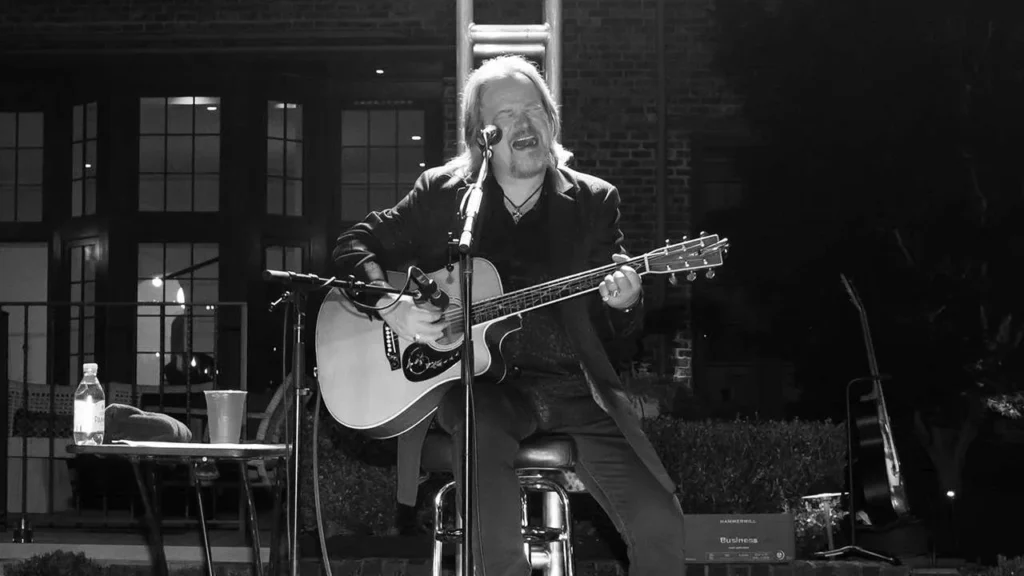
A prayer with calluses—Travis Tritt’s “Lord Have Mercy on the Working Man” lifts a blue-collar plea onto a big chorus and lets dignity, not pity, do the singing.
Let’s steady the facts before the feelings take over. Written by Kostas, “Lord Have Mercy on the Working Man” arrived as the lead single from T-R-O-U-B-L-E on August 10, 1992, produced by Gregg Brown. It became Tritt’s tenth entry on the country chart and peaked at No. 5 on Billboard’s Hot Country Singles & Tracks (and No. 10 in Canada). On the album, the cut stretches to 4:55 (the single runs 4:12). The music video, directed by Jack Cole, paired Tritt’s performance with imagery of everyday burdens and policy talk—a blunt visual that, as one critic noted, echoed the mood of the 1992 election year.
Part of the record’s power is communal. When the final chorus swells, you’re hearing a front-porch choir of country stars—Brooks & Dunn, T. Graham Brown, George Jones, Little Texas, Dana McVicker, Tanya Tucker, Porter Wagoner—stacked behind Tritt. The liner notes also tip you to the cut’s tactile palette: Sam Bacco rattling spoons, wobble board, crotales, even a broom, Richard Bennett and Wendell Cox trading guitar licks, Terry Crisp’s steel sighing through the changes. It’s populist to the bone, yet meticulously built.
What the song is about hardly needs decoding. Tritt sings for folks who keep the lights on—blue-collar men and women squeezed by bills, by politicians’ promises that don’t reach the kitchen table, by the simple math of too much month and not enough paycheck. The lyric never curdles into complaint; it asks for mercy without surrendering pride. That’s why older ears still lean toward it: the voice knows how to be weary without being small.
Spin it with the album context in mind and the craft glows. T-R-O-U-B-L-E (released eight days after the single) is Tritt operating at full stride—radio-tough, Southern-rock-leaning, and unafraid to let a straight-talk ballad breathe. Sequencing this track as the record’s first calling card was shrewd: the arrangement leaves air around the beat, the verses walk rather than lunge, and the hook arrives like a workingman’s amen—shoulders back, hat in hand, no theatrics. When that celeb chorus rolls in at the end, it doesn’t feel like garnish; it feels like company showing up when the bills come due.
The video matters, too. Shot against a high-key backdrop with cut-ins of news and policy, it “confronted a litany of personal oppressions attributed to government policy,” as Curtis W. Ellison put it—turning a country hit into a little piece of the national conversation without preaching. That was 1992 all over: an election fought in diners and union halls, where songs like this one functioned as shorthand for entire neighborhoods’ worries.
Listen closer and you’ll hear the small studio mercies that keep the record aging well. The drums are certain rather than loud; the bass nudges the bar line forward; harmonica and steel color the margins then get out of the way. Even the novelty textures—the spoons and broom—aren’t a stunt; they’re a reminder of hands that work. And Tritt’s baritone does what grown men learn to do when they’ve run out of pretty speeches: ask plain and stand still.
For those who like their notes neat:
- Artist: Travis Tritt
- Song: “Lord Have Mercy on the Working Man” — written by Kostas; single released Aug. 10, 1992; US Country #5, Canada Country #10; album vs. single lengths: 4:55 / 4:12; producer: Gregg Brown.
- Album: T-R-O-U-B-L-E (Warner Bros. Nashville, Aug. 18, 1992); backing-vocal “choir” on the last chorus includes Brooks & Dunn, T. Graham Brown, George Jones, Little Texas, Dana McVicker, Tanya Tucker, Porter Wagoner.
- Video: Jack Cole, with imagery linking personal struggle to policy debates; widely read as timely in 1992.
Play it again tonight and notice what it doesn’t do. It doesn’t flatter you for hurting. It doesn’t scold you for hoping. It simply names the pressure and asks for a little light—mercy, not miracle—so a person can keep their back straight and their word good. Thirty-plus years on, that’s still a kind of prayer worth singing.